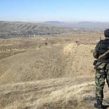
Kazakhstan’s Border Protection Service Rocked by a New Wave of Incidents
Publication: Eurasia Daily Monitor Volume: 10 Issue: 27
By:

On the last day of January, Kazakhstani media reported that Major-General Talgat Yessetov, the director of the Border Service Academy under the National Security Committee, had committed suicide in his office in the country’s capital. Before his appointment as the head of an elite military school providing quality training to Kazakhstan’s future border guards and directly dealing with the issues of national security, Yessetov served as the commander of the Border Service’s South (“Ontustik”) division. Between 2002 and 2009, he already commanded the North (“Soltustik”) division and earned the reputation of a professional and loyal official with deep knowledge of security matters, especially with regard to the protection of Kazakhstani external borders. While the true motives behind Yessetov’s decision to kill himself with a service pistol still remain unknown, Kazakhstan’s security apparatus has already launched a comprehensive internal investigation, supervised by a specially designated prosecutor with extensive authority (Kursiv.kz, January 31).
Several days later, on February 4, the 26-year-old deputy head of a remote border outpost, administratively placed under the supervision of the Border Service’s East (“Zhygys”) division and located close to the Kazakhstani-Chinese border, shot himself in the head on his way back to the barracks. This death, which occurred in relatively strange circumstances, has aroused additional speculation about the state of affairs within Kazakhstan’s border protection body previously rocked by a series of incidents involving both rank-and-file and highly placed officials (Total.kz, February 5).
Earlier in December, a week before the country celebrated the New Year, the head of the Border Service Turganbek Stambekov, appointed in June 2012 following a multiple homicide at the Arkankergen outpost in Almaty province, died in a plane crash 20 kilometers from the city of Shymkent. While the airplane used by the National Security Committee had been equipped with state-of-the-art technology in order to ensure the highest level of safety to its elite passengers, its pilots presumably lost control of several navigation devices, with weather conditions also being particularly difficult for completing a smooth landing. In addition to the Border Service head, the plane also carried Stambekov’s wife, seven crew members and 19 other border protection officers, including the acting commander of the South division and his deputy as well as the heads of two border posts located in Southern Kazakhstan (Tengrinews.kz, December 25, 2012; Komsomolskaya Pravda, December 26, 2012).
This sequence of tragic events was preceded by other alarming incidents taking place within the purview of Kazakhstan’s border protection authorities. The Arkankergen killing of 15 border guards in late May 2012 quickly became one of the most discussed topics in the Kazakhstani media, as the most active members of society immediately divided between those who supported the official version of the investigation and others ferociously opposed to it, eagerly invoking various conspiracy theories to account for the killing of 15 soldiers on the Kazakhstani-Chinese border (see EDM, June 27, 2012). The only surviving protagonist of this incident, Vladislav Chelakh, 19, was sentenced to life imprisonment in mid-December 2012, after a string of controversial hearings during which he even attempted to commit suicide in court. His sentence was recently confirmed by an appeals tribunal (Newskazk.ru, February 6).
On December 12, the country’s parliament adopted a new law on the state borders, initiated by President Nursultan Nazarbayev in the wake of the Arkankergen killings. The previous version of the law, dating back to 1993, was unanimously considered no longer compatible with present-day challenges to national security. Apart from delineating the responsibilities of a border protection commission serving as a consultative body under the Kazakhstani government, this law also established particular conditions of recruitment into the Border Service’s ranks. For instance, potential recruits are hence obliged to undergo a psychological examination aimed at assessing their mental health and fitness for service in difficult living conditions; they are also expected to take a lie detector test (Newskaz.ru, December 12, 2012).
Recently, President Nazarbayev mentioned the ongoing development of a terrorist and extremist threat reduction strategy that is expected to run through 2020. He also insisted on the necessity of ensuring better inter-agency coordination and mobilizing all of the available resources for the timely prevention of terrorist and extremist attacks on both civilians and law enforcement officers. Another proposal contained in Nazarbayev’s address to the country’s main security bodies concerns a possibility of organizing comprehensive exams for currently serving border protection officials, on the model of a similar campaign conducted last year by the ministry of internal affairs. This campaign concluded with the departure of over 16,000 police officers considered to be unfit for their demanding duties (News.Nur.kz, January 30).
Despite the sincerity of such attempts to reestablish order within the ranks of the Border Service, Kazakhstan’s government and the heads of security agencies based in Astana are confronted with several challenges. Firstly, the scarcity of Kazakhstan’s population, especially with regard to its disproportionately large territory, makes it difficult for central authorities to ensure effective supervision over remote border outposts, which are mostly controlled by local officials who can easily establish their own rules of the game and preclude any resistance to corruption or hazing, should such practices be in use. According to the outcomes of a formal investigation, the Arkankergen homicide could have been prevented had the personnel of this small border post been better supervised by their superiors—stationed just 26 km away from the place of the tragedy.
Secondly, the problem of corruption still remains a burning issue; corrupt officials are thus able to divert budgetary funds from their destinations, which logically leads to underfunding, poor living conditions, a growing disinterest towards military service as well as diminished loyalty toward the central government. It remains to be seen whether new anti-corruption policies announced by Nazarbayev in his “Kazakhstan-2050” speech will yield better results and improve the situation in the Border Service.




